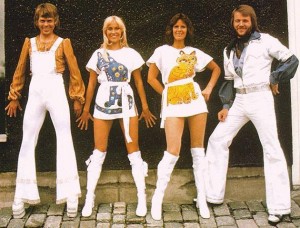When a bright, inquisitive eleven-year-old looks at you in befuddlement and asks, “How is that news,” you know something is amiss. But that’s what’s been happening virtually every evening as my son and I sit enduring ABC World News Tonight. This show, in case you aren’t familiar with it, is a 30-minute, nightly show putatively intended to deliver important news from around the civilized world and Texas. That’s 30 minutes including advertisements, which probably consume 6 or 7 of those overpriced minutes (and always mention either diarrhea and/or erections, two things that, under all circumstances, should remain separate).
Leading with what many Americans would agree is the day’s most important story, the shows start off reasonably well. Unless this story is truly gruesome and/or still unfolding with the potential for further on-camera bloodshed, they rarely devote enough time to get beyond the fundamental facts. But okay, time is limited, much can happen in 24 hours, and the American attention span is shorter than this sentence would have been if …
The second story is also usually relevant and mildly informative, with a live, on-the-scene reporter and some video or pencil drawings. By the third story they’ve likely touched upon American politics or business (is there a difference?), the Middle East, and whatever else might hold for ninety seconds or so the attention of viewers. Then, if they haven’t already gone to the first ad—before which is a vague tease about what’s coming up (they always withhold the critical details, despite the fact that you can Google the story in three seconds)—there is a brief pitch for some wonder drug, beaming adults in casual clothes frolicking, oblivious, across the screen, followed by a 45-second litany of side-effects I’d have to be dying of a severed head to risk. This pharmaceutical promises swift relief from high blood pressure, diabetes, an overactive bladder, or erectile dysfunction, but also causes the other three.
After the advertisement they touch on two or three other stories that might matter to someone, but by the time we’ve survived the second commercial break and have begun to actually suffer from several of the aforementioned side-effects, the show degenerates like cheap toilet paper in boiling acid and my son and I sit wondering if there isn’t something somewhere on this planet more important, more worth sharing with this massive (and apparently chronically ill) audience than the following actual examples:
- The little English girl who lost her favorite stuffed bunny.
- Mallomars’ 100th anniversary.
- A lone woman dancing at a bus stop.
- A record number of Christmas lights at a home in Australia.
- How to assemble a hit boy band.
- Abba is considering a reunion tour (kill me).
- How to vote for the National Thanksgiving Turkey (Caramel V. Popcorn).
- What—are you ready?—what dead rock stars might look like had they lived.
- (This one—aired last Friday—was so nauseatingly implausible I had to make sure I wasn’t hallucinating) A soporific montage of the week’s “best” inconsequential Internet-feed trumperies.
- That’s right: The “Best” of.
- A hallucination would have been a relief.
 In addition to being insubstantial and irrelevant, by the time these nuggets of ridiculum appear on World News Tonight, they are well past their expiration dates and emitting offensive fumes. At least when they first made the rounds on social media, I had the option not to click on them.
In addition to being insubstantial and irrelevant, by the time these nuggets of ridiculum appear on World News Tonight, they are well past their expiration dates and emitting offensive fumes. At least when they first made the rounds on social media, I had the option not to click on them.
It seems clear to me that some overpaid executive at ABC, aware that they were now competing for an audience with the Internet, decided they should become more like the Internet, but a week or two behind. It doesn’t seem to me a particularly intelligent approach to competition, but hey, if you think you might have missed something on Facebook, or you’d like a little news and a bunch of medical ads mixed in with last week’s brain-Drano, you can turn on your TV and watch network news self-destruct.
Maybe next week some bright, young film studio executive, concerned about increasing competition from television, will see the imaginary logic in this approach and start slipping ads for erectile dysfunction and overactive bladder into their feature films with little “like” buttons for each symptom or side effect.
Now if you’ll excuse me I feel a symptom coming on, or maybe I just have an overactive erection.

Well, it’s definitely gone now.

